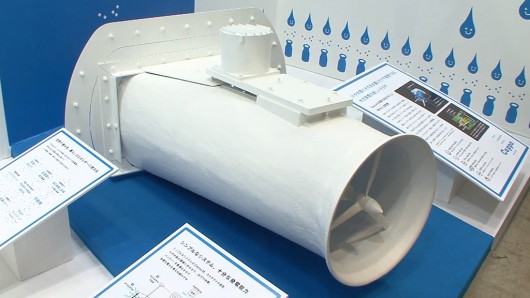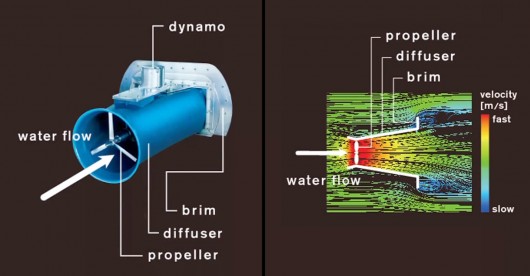Ibasei's Cappa provides hydroelectricity on a small scale
By Darren Quick
December 12, 2012

The Cappa compact hydropower generator can deliver 250 W of electricity
Despite being the most widely used form of renewable energy worldwide, hydroelectricity is generally reserved for large-scale commercial installations built around massive dams. Japanese company Ibasei has shrunk things down and removed the need to build a dam with its Cappa compact hydropower generator – a system that's designed to be installed along a river or waterway.
The basic design of the Cappa is nothing new – blades rotate as the water flows through the unit, which drives a turbine to generate electricity. However, the unit is encased in a special diffuser that is designed to increase the velocity of the water at the point where it passes over the blades, thereby increasing the unit’s electrical output.
A company spokesman tells DigInfo that a water flow of 2 m/s (6.5 ft/s) will see one unit produce 250 W of electricity, while five units together will generate about 1 kW, taking control losses into account. The unit produces 100 V AC electricity at 50/60 Hz, so it can be used to power appliances around the home. The unit itself is also 100 percent recyclable and has an uptime of virtually 100 percent.
While you’d need quite a few of these things to completely power the average household – and I don’t know a lot of people with steadily flowing rivers running through their backyards, Ibasei anticipates the device could come in handy for providing power to remote communities and tourist attractions and in the event of natural disasters – floods in particular seem like a good fit for the technology.
While larger blades have the potential to deliver more power, their optimum size is determined by the size, width and speed of the river in which they are placed. For this reason, Ibasei would like to survey each river in which a unit is to be placed to customize a system for each customer.
The company is currently in the final development and testing stage and hopes to have the Cappa available for purchase in 2013. The 250 W model is expected to be priced at around the cost of a compact car.
The Cappa is explained in the video below.
Source: DigInfo TV

 Darren's love of
technology started in primary school with a Nintendo Game & Watch Donkey
Kong (still functioning) and a Commodore VIC 20 computer (not still
functioning). In high school he upgraded to a 286 PC, and he's been
following Moore's law ever since. This love of technology continued through
a number of university courses and crappy jobs until 2008, when his
interests found a home at Gizmag.
Darren's love of
technology started in primary school with a Nintendo Game & Watch Donkey
Kong (still functioning) and a Commodore VIC 20 computer (not still
functioning). In high school he upgraded to a 286 PC, and he's been
following Moore's law ever since. This love of technology continued through
a number of university courses and crappy jobs until 2008, when his
interests found a home at Gizmag.